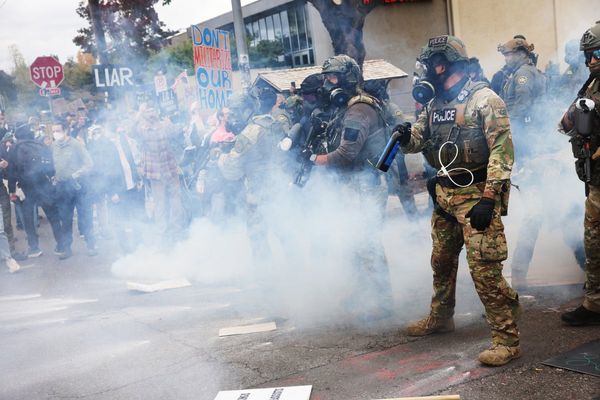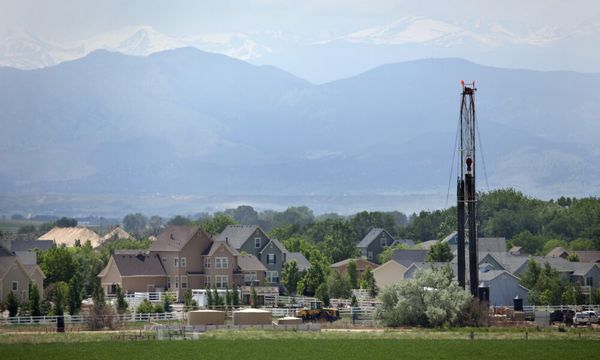
Last month, Anthony Soshil went to renew his passport in Lahore at a normally sleepy bureaucratic office. He had a contact there and expected to be ushered straight to the counter. Instead, he was flung into a melee of thousands of desperate people. Fights were breaking out everywhere. Police were summoned to quell the crowds. Quickly overwhelmed, the police called the army.
Last year, more than 800,000 Pakistanis left the country in search of better economic prospects abroad. With rocketing inflation and the rupee devaluing by 30% during 2022, millions of urban middle-class people have been pushed to the brink of poverty. Cataclysmic floods have ravaged the rural poor. With only enough foreign reserves to pay for less than a month of imports, the state is on its knees.
“I had a thriving business right up until Covid,” says Soshil, a musician and music producer. Back then he managed a rising superstar whose nationwide concerts were sponsored by big corporations. He also had lucrative gigs with his own band and produced gospel music for the church as well as commercial jingles at his small recording studio. He was making the equivalent of almost $2,000 a month. Today, with corporations slashing their budgets and his clients migrating to the west, his income has halved while inflation has risen by 40%.
Pakistan has always spent far more on imports than it has earned in exports. It is a big exporter of labour but the remittances Pakistanis working abroad send home are frittered away on consumption. They are not invested in industry. Though it is a cotton-producing country, the textile sector remains underdeveloped. Promising IT activity has not blossomed into a tech boom, unlike in neighbouring India. With a third of its 230 million-strong population under the age of 14, Pakistan has one of the highest rates of population growth in the world, and job creation cannot keep pace.
Successive governments have provided lavish and unfunded fuel, water and power subsidies but have not invested in quality education, health provision, alternative energy or even a strategy for population control. The tax base is among the lowest in the world. An added drain on the country’s strained resources is the world’s sixth largest military. Spanning everything from golf courses to banks, it owns the country’s biggest industrial conglomerate. A massive defence expenditure and the generals’ eye-watering perks appropriate a sizeable chunk of the budget.
Having teetered on the edge for decades, the rise in global commodity prices and the war in Ukraine have tipped the country into crisis. Desperately reliant on imported fossil fuels and wheat, the economy has been hit hard. As a result, the government has had to pass on price hikes in electricity, fuel and food.
Struggling with a foreign-exchange crisis, the government has slapped bans on imports. Allied with rising costs – fuel has doubled since 2020 and electricity bills have tripled – it has led to mass closures of businesses and millions of job losses. Prices of ordinary foodstuffs such as flour, onions and oil have risen steeply. Meat has become unaffordable except for the well off.
Dr Ali Cheema, a professor of economics at the Lahore University of Management Sciences, quotes a study of a lower middle-class neighbourhood in Lahore. “People have stopped buying clothes, reduced their food intake and cut down on medical expenses,” he says. “But they are still protecting, as best as they can, their children’s education.”
Financial stress has strained the social fabric. Daily reports are circulated on WhatsApp groups of armed burglaries, muggings and carjackings at gunpoint. Teachers at non-elite schools report a spike in marital strife, domestic violence and mental illness. With desperate parents holding down two or three jobs, children are anxious. Some have confided to school counsellors of having suicidal thoughts.
People are fed up with their ruling elites. The all-powerful military not only meddles in policy but seldom allows elected governments to complete their tenure, lest they deliver economic growth and become popular enough to challenge them.
In constant fear of being toppled by the generals, political parties don’t have the bandwidth to institute coherent structural reform when in power. That said, few politicians bother; many concentrate on shoring up their personal bank balances. Successive elections bring little change with the same discredited, dynastic parties playing musical chairs.
Four years ago, the cricketer turned politician Imran Khan was elected as prime minister, having captured the public imagination with his populist message of a clean, principled government. But his promises were hollow. He presided over an incompetent administration that has been accused of corruption, more focused on harrying his opponents than fixing the economy.
Three years into his term, he was bundled out in a vote of no-confidence and replaced with a flailing coalition government drawn from that same stagnant pool. Since then Khan, who used to boast of being in lockstep with the then army chief, General Qamar Javed Bajwa, has accused him of engineering his fall.
There is just one way out of Pakistan’s economic mess. The army must stop its political machinations and make way for civilian supremacy. Only a government with a popular mandate and the assurance of a full term in office can have any hope of effecting meaningful reform. But nothing has changed. Now with another election in the offing, national headlines are dominated not so much by the urgency of averting economic implosion but by disqualifying the still popular Khan’s candidacy.
Living in London, I watch with increasing dismay and anxiety as turmoil grows in the country of my birth. I have close family and friends there who are struggling to maintain some semblance of normality; every day brings new privations, new fears and new restrictions. Meanwhile, as Pakistan inches ever closer to full-blown catastrophe, anyone who can is fleeing the country.
Moni Mohsin is a Pakistani writer based in London and the author of The End of Innocence







